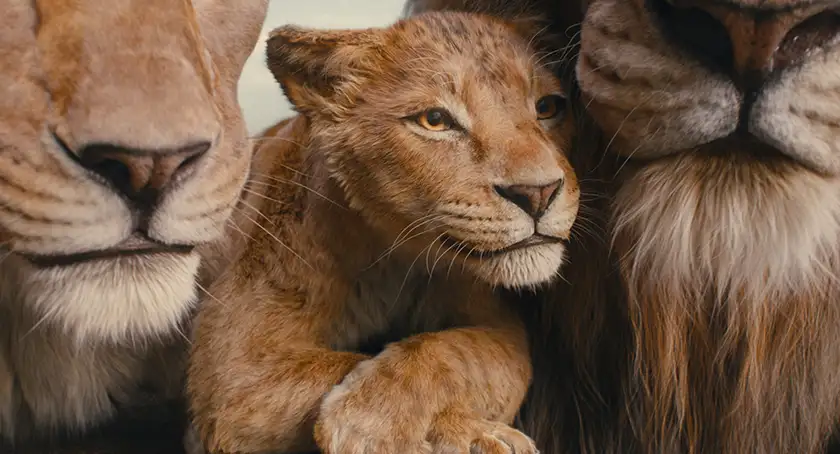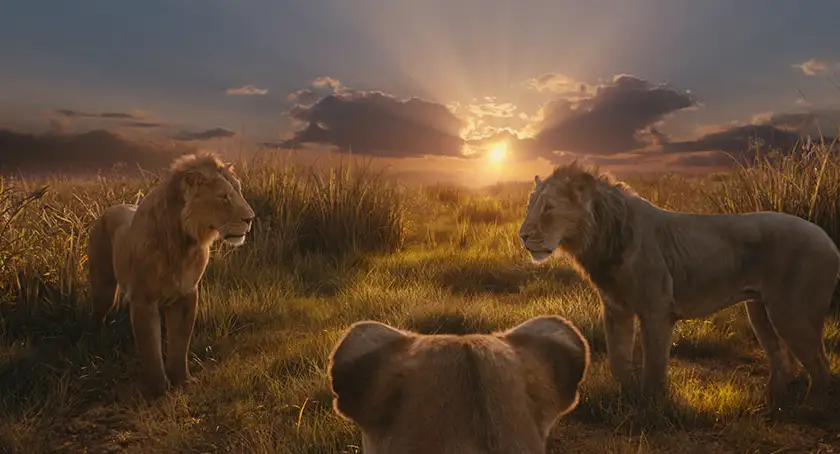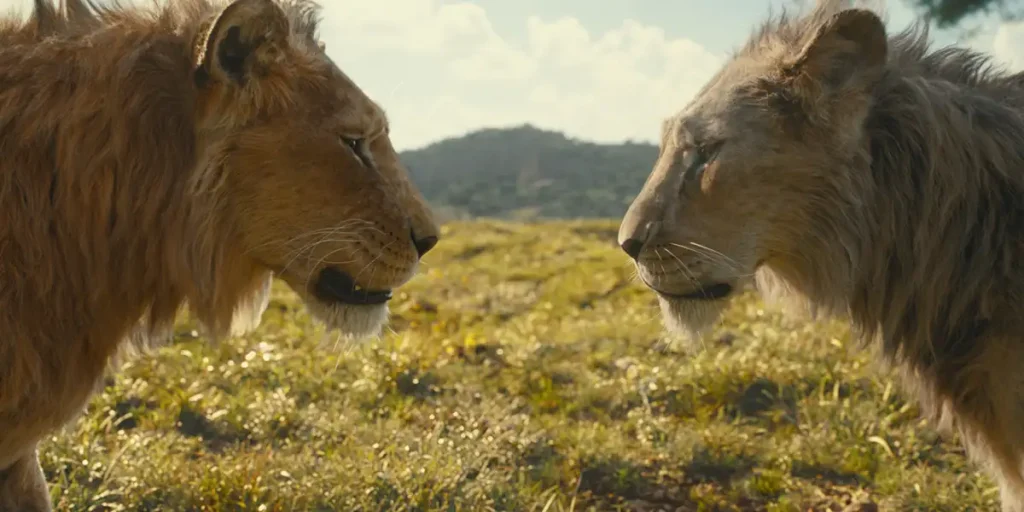Mufasa: The Lion King doesn’t reach the storytelling heights of the 1994 film, but it’s much better than the 2019 live-action movie and audiences will enjoy it.
Director: Barry Jenkins
Genre: Adventure, Drama, Live Action
Run Time: 120′
Release Date: December 20, 2024
Where to Watch “Mufasa: The Lion King”: In US theaters, in UK & Irish cinemas, globally in theaters
The Lion King (1994) was the first film I ever saw on the big screen, and it’s also one of the best movies Disney has ever made. Not only is its storytelling so much more sophisticated than the average animated film – even its co-directors, Roger Allers and Rob Minkoff, often describe it as “Hamlet with lions” – but the combination of multifaceted characters, iconic tunes, high emotional stakes, and an ever-present layer of irony make it the perfect watch for audiences of all ages.
When the first live action movie was released, I was disappointed to find that part of what I loved in the original was completely missing in the remake. Jon Favreau’s The Lion King (2019) is a well-crafted film, but it lacks the heart that made the 1994 movie so special, and though it does have its moments, a series of creative decisions make it a forgettable watch overall. With all this in mind, I went into Barry Jenkins’s (Moonlight) Mufasa: The Lion King with low expectations, which were partly confirmed by a story that lacks in imagination and some puzzling narrative choices. However, I also found myself caring a great deal about these characters, completely immersed in the stunning world-building, and content to spend time with its titular lion even if I knew exactly where the story was going. Mufasa is a film that was made with love, and that’s why audiences will enjoy it despite its flaws.
Our adventure begins when young Mufasa (Braelyn Rankins) is separated from his family by a flood. Suddenly, our brave but inexperienced cub finds himself in unfamiliar lands, not knowing how to get back home. Luckily, he immediately meets another cub named Taka (Theo Somolu), who decides that the two of them are going to be like brothers. Despite some initial resistance from Taka’s father, King Obasi (Lennie James), Mufasa is taken in by the family, provided he lives with the lionesses, as he is not to be mistaken for the future heir.

Soon, both Mufasa (now played by Aaron Pierre, of Brother) and Taka (Kelvin Harrison Jr., of Elvis) grow into lions, and they’re still as close as ever, with Taka listening to his father’s questionable teachings about how kings should behave and Mufasa learning valuable lessons from Taka’s mother, Queen Eshe (Thandiwe Newton). Still, some things are becoming increasingly clear, such as the fact that Mufasa is clearly so much better than his stepbrother not only at hunting and fighting – two tasks that lions consider to be “manly,” and king-like – but also at being a lion in general. And so, when a pride of white lions attack them, it’s Mufasa, and not Taka, who saves the family.
This alters the duo’s dynamics, which evolve even further when King Obasi sends them both on a journey to find a mythical land. That’s when they cross paths with the charming Sarabi (Tiffany Boone), with whom Taka immediately falls in love, only to discover that Mufasa’s abilities surpass his own where relationships are concerned too.
The relationship between Mufasa and Taka is a complex one, and director Barry Jenkins and writer Jeff Nathanson (Young Woman and the Sea) do a great job of showing us this evolution without turning any of them into a villain. Both lions clearly love one another and want each other to succeed, but they don’t know how to deal with others’ expectations, which are often in conflict with their own natures and desires.
On one hand, we have Taka, who’s destined to be King but who realizes that he’s not cut out for it, as – perhaps due to the lack of a positive role model, which Mufasa had in his own father – he still hasn’t learned how to be brave and independent. And then there’s Mufasa, whose name means “king” despite his humble origins and who just-so-happens to excel at being one, effortlessly embodying a good leader’s character traits even if he was not born a royal. As the narrative unfolds and both make choices that will alter their friendship forever, we can’t help but empathize with them both and care about them even more.
And then there’s the ruthless Kiros (Mads Mikkelsen), leader of the white lions and the sexiest lion to graze our screens ever since Jeremy Irons’ Scar back in 1994. There’s a scene in the film where our villain is about to fight another lion and we see him take his time to stretch out and crack his paws before he makes his move, a simple gesture that shows us just how cynical, smug and unpleasant he is. Yet we also can’t fully hate him, as Mufasa: The Lion King finally gives us one of those charismatic antagonists we’re drawn to despite how inhuman or immoral they are. Needless to say, Mads Mikkelsen is flawless as a character that he was born to play, not only in his many speaking scenes but also with his rendition of “Bye Bye,” without a doubt the best song of the entire film.
Overall, the music is a little weak, especially compared to the utter beauty and poetry that was Elton John’s score for the first movie. Here, the instrumental score (Dave Metzger, of Wish) features many nods to the first film that will give you goosebumps simply for the nostalgia of it all, but the original cues for the 2024 film also feel unremarkable in comparison. The actual songs in Mufasa: The Lion King were written by Lin-Manuel Miranda, one of the best songwriters around when it comes to musicals, but parallels to the 1994 classic are inevitable, and most of this music sadly feels bland compared to tracks like “Can You Feel The Love Tonight” and “The Circle of Life,” which, alone, are part of what made the original film the masterpiece that it is.

Mufasa: The Lion King also features some puzzling storytelling choices, the most obvious one being that the first movie established that Mufasa was one of the last kings in a long line of monarchs that have been protecting their kingdom for many years, which is why Simba was destined to inherit the throne as an adult. Without going into spoiler territory, this prequel contradicts this tale in many ways, not only with Mufasa’s own blood lineage but also with the origin of his kingdom and even the Pride Lands themselves. It’s because of this that we get to see how Pride Rock came to be, though, which is one of the most moving and, let’s face it, coolest scenes of the film, so this change in the lore does have its perks.
Something else that the movie could have done without is the narrative frame provided by Rafiki (John Kani, of Black Panther). The movie begins with Simba (Donald Glover) and Nala (Beyoncé) pretty much abandoning their daughter Kiara (Blue Ivy Carter) for a few days without telling her why, which, in itself, feels not only narratively awkward, but also unnecessarily traumatic for the young cub, who is often seen missing her family and wondering if they’re ever going to come back. Still, this gives Kiara a chance to be entertained by Timon (Billy Eichner) and Pumbaa (Seth Rogen), until Rafiki takes over and starts telling her Mufasa’s story.
As a result, the film often jumps back and forth in time, in what was clearly an attempt to provide children with comic relief and older audiences with the chance to see some familiar faces. Yet, the moments we spend with Kiara, Rafiki, Timon and Pumbaa often feel like those standalone animated shorts that you sometimes find on streaming services, which very young children tend to watch on repeat for a while until they move on to something else. Sadly, these scenes aren’t even funny at all, and in a film that’s already two hours long, I’m not sure we needed them.

What it lacks in music and storytelling, Mufasa: The Lion King makes up for it in world-building and visuals, as these lions are so spectacular and realistic that you’ll have to restrain yourself from stretching out your hand to try and touch their manes. If the 2019 live-action film’s hyper-realistic renditions of the lions took many viewers out of the story, here it feels like visual effects supervisor Adam Valdez (Jurassic Park) and his team found the right formula. Not only do all the animals feel realistic in a much more natural way – also thanks to the use of a 3D creation tool called Unreal Engine that many cinematographers, including Poor Things‘ Robbie Ryan, use nowadays, which gives shots a photographic feeling – but their movements also feel true to their real-life counterparts, down to minor details like the way the lions’ ears move to reflect their attitudes toward each other.
When my screening ended, audiences left the room teary eyed and with a big smile on their faces, and this is why you should seek out the film. Mufasa: The Lion King is not revolutionary and doesn’t even come close to the first movie in originality and creativity, but it has enough heart to reach viewers. With gorgeous animation and a story about destiny, family, and the circumstances that shape us into who we are, Mufasa is an empathetic tale that was made by creatives who love the original film as much as you do. You’ll enjoy the time you’ll spend with these characters, in what is certainly an improvement over its live-action predecessor, despite its flaws.
Mufasa: The Lion King – Movie Plot & Recap
Synopsis:
Mufasa is separated from his family as a young cub and befriends a friendly young lion named Taka who welcomes him into his royal family. When the two set off on a journey and their destinies become clear, their friendship keeps evolving until they both find out who they truly are.
Pros:
- An empathetic story made with love
- Impressive live-action animation, visual effects and world-building
- Complex, compelling dynamics between the film’s protagonists, with a fantastic villain in Mads Mikkelsen’s Kiros
Cons:
- An unnecessary narrative frame that doesn’t provide any comic relief
- A score and soundtrack that don’t live up to the original film
- The story could have been more original and deviates from the lore
Mufasa: The Lion King is now available to watch globally in theaters.

